- Home
- Neal Stephenson
The Mongoliad: Book Three Page 34
The Mongoliad: Book Three Read online
Page 34
A large crowd gathered near the Khagan’s ger: courtiers, merchants, Torguud—both on horseback and on foot—and other riders, bearing the sky-blue banners of the Darkhat. As she and Gansukh approached the verge of the crowd, a ripple ran through the host as they parted to allow someone to approach the steps of the wheeled ger.
Ögedei ascended to the platform and turned to address the crowd. He planted his feet firmly on the wooden platform, standing more firmly than he had earlier, and when he spoke his voice was strong and clear. As if his words came straight from an equally clear and resolute mind. “I have offered my prayers to the spirit of my father and to the spirits of our ancestors, Borte Chino and Qo’ai Maral. They have accepted my prayers and blessed my sacred mission.” The Khagan paused as the audience cheered his pronouncement, and Lian noticed he did not lean on the railing for support while he waited. “We have come to this sacred land to hunt a great beast, a martial spirit of our ancestors. Our success in this hunt will ensure the prosperity and longevity of the empire.” Another cheer interrupted him, and he swayed slightly as if buffeted by the fervor of those gathered. “Clan Darkhat has shown us this pleasant valley,” Ögedei continued, “and this will be our camp for the duration of our stay. By the pleasure of the Blue Wolf, let us not stay long!”
The audience erupted into noise once more, and Ögedei’s final words were lost in the cacophony of voices. The Khagan threw up his arms, exulting in the adoration of his subjects, and then he turned and disappeared into his ger.
“There will be a feast tonight,” Gansukh whispered, his mouth close to her ear. “That is when the hunt begins.”
Which hunt? Lian thought, a shiver running along her arms.
Unlike the intricate and complicated preparations necessary to organize the caravan, setting up camp and preparing for a feast were activities that the host of servants, attendants, tradesmen, and guards knew by heart. Oddly enough, these few hours were some of the only unstructured time Master Chucai had. Typically, he would withdraw to his ger and spend a few hours in delightful solitude, but tonight, as the camp buzzed with preparations for an immense feast to celebrate the Khagan’s hunt in the morning, he sought out two men: Alchiq, the old drunk, and Ghaltai, the leader of the Darkhat.
He found Alchiq near the wagons carrying the prisoners from the West. The gray-haired veteran was assisting with the sparse meals for the caged fighters, and when he noticed Chucai watching, he handed off his bucket of slop and rice to the caravan master.
“Good evening, Master Chucai,” he said, offering a short bow. “May I be of assistance?”
“How is it that a one-time companion of the Khagan—a man who commanded at least a jaghun in his time—is now serving slop to foreign prisoners?” Chucai asked with some curiosity. The idea of Munokhoi serving in this stead floating across his mind, and he quickly dismissed such a possibility as unlikely.
“After you exiled me, I drank a great deal,” Alchiq said. “I rode and I drank; I didn’t care where I went, just as long as I could refill my skin of arkhi.” He gestured at the row of cages behind him. “Serving men like this was all I was suited for.”
“And yet, earlier today, you wanted to serve your Khagan again.”
“I’ve never stopped wanting to serve,” Alchiq corrected him. “But I was a drunk. I stood by the Khagan and gave him an excuse to drink. We had conquered the world. What did it matter what we did next?”
Chucai said nothing; the man clearly had a speech he had been waiting a long time to deliver. Better to let him get it out.
“But it did matter, didn’t it?” Alchiq said. “That was why you banished me and the others. Why you kept reminding the Khagan of what his father had accomplished.” Alchiq shook his head. “We all hated you; we thought you were the poison that would destroy the empire.” He spat in the dirt.
“Why did you come back?” Chucai asked.
“I was with Batu Khan as he conquered lands in the Khagan’s name,” Alchiq said. I was there when he stormed Kiev, and I rode with his men when they tried to take the white citadel at the top of the hill.” Alchiq lifted his long hair off his neck and showed Chucai the ravaged line of scar tissue that ran down his neck and disappeared into his robe. The flesh was bubbled and ragged as if the skin had been liquefied and then allowed to cool.
“We tried for two weeks to take the citadel,” Alchiq continued, “and would have continued to throw ourselves against its walls until every last one of us were dead if Batu had had his way. It was General Subutai who pulled him away from the siege. There were only a handful of warriors in the keep, the general argued, and there were other lands to conquer. Beating down those walls was not worth the effort, not when there were richer prizes to be won more easily. Batu relented, but he left some of us behind. To wait for the day when those gates opened and we could finish them off.”
Alchiq stared at the cage that held the red-haired giant. “I waited a long time,” he continued, his voice more thoughtful. “I commanded more than a jaghun, Master Chucai, but, over time, more and more of them wandered off, chasing after Batu’s army. My men and I ranged far from Kiev, policing these lands as subject to the Khagan’s rule, exacting tribute as we saw fit. But we always came back to Kiev. We always came back to see if those gates had opened. But they never did. Not for us.”
“Why come back here?” Chucai asked again. “Shouldn’t you have reported your failure to Batu?”
Alchiq smiled at him, a fierce feral grin. “I didn’t fail. They came out eventually, and I was waiting for them. My jaghun caught them near the Ijil Mörön, the big river also known as San-su.”
Chucai sucked on a tooth and shrugged, indicating the geographical subtlety of Alchiq’s story was lost on him.
“The Ijil Mörön lies east of Kiev,” Alchiq explained. “And while my men slew all of the women who came from the white citadel in Kiev, the others decimated my men not a week later.”
“Wait—” Chucai’s attention snapped to the older man’s words. “Women? Others?”
Alchiq nodded. “The warriors in the white citadel were all women—they were called skjalddis by the people who survived Batu Khan’s conquest. They left their citadel to travel east, escorting a group of men whom I have fought twice now and barely survived both times. Each time I met this band, they were farther east, closer to the center of the empire.”
Chucai laughed, unable to help himself. “You think they are coming here? To threaten the Khagan?” he asked.
“I do not know what their goal is, but I fear it is to strike at the heart of the empire.”
“How many were there? Fifty?”
“Less than a dozen.”
“Against three hundred of the Imperial Guard? Against the minghan who can be summoned from Karakorum?” Chucai scoffed. “I think you overestimate their chances.”
“Maybe,” Alchiq said. “But how long has it been since the empire has fought a worthy foe? Has anyone since Genghis Khan been in a battle he could not win? Does the Khagan know what it takes to defeat an enemy that will not submit?”
Alchiq had been watching the white-haired prisoner while he spoke, and Chucai’s gaze was drawn to the young prisoner. The youth was slouched against the bars of his cage, his head turned partially away from them—his gaze fixed and unfocused on the slope of a nearby ger. One of his hands flopped out of the cage. He gave all the impression of being dazed and indifferent to anything going around him, and Chucai was struck by the stark difference between this lassitude and the way the youth had stared at everything when he had first seen him outside Karakorum.
Alchiq gave a curt nod, and angling his body away from the cage, signaled Chucai with a finger to his lip and then to his ear. The boy is listening.
“It took me many years to realize you were right, Master Chucai,” Alchiq said. “I was the poison that would have destroyed the empire. But not anymore. I’m the one who is going to help you save it.”
Chucai stared at the white-haired boy w
ith a mixture of wonderment and curiosity. A spy? Was Alchiq suggesting that the boy was an advance scout—of all things—for a party of warriors from the West?
The idea was ludicrous and incredibly daring or... it was a paranoid fantasy concocted by the arkhi-damaged brain of a bitter old soldier.
Either way, Chucai realized, this man is an annoying complication. It was far better for him to stay here, watching the prisoners, than to be whispering these sorts of ideas in the Khagan’s ear. He had enough trouble with Ögedei as it was. He didn’t need the additional headache of the Khagan being spooked by outlandish theories from old drunks.
Haakon was still mulling over the conversation he had overheard between the black-bearded man and the quiet gray-haired Mongol when a pair of guards approached his cage. One of the two whacked on the bars with a spear shaft, getting his attention, and he slowly scooted back to the center of the cage. The other man busied himself with the lock on the door, and Haakon filed away his thoughts for later reflection.
Provided there was a chance to reflect later.
The Mongols had fed the prisoners earlier, a tradition the caged fighters all understood: a decent meal meant they were going to fight soon.
Once his cage was unlocked, Haakon crab-walked out. He stood upright, stretching for a few moments, and then allowed himself to be prodded in the direction of the feast—an orange glow over the peaks of the line of ger. Voices, flush with wine and airag, buzzed like angry bees lurking in the folds of the ger. He shook his arms out as he walked, trying to loosen his muscles and work out some of the knots he couldn’t quite rid himself of in the confines of the cage.
He tried not to think about the word he had heard the old warrior use. Skjalddis. Shield-Maidens.
The fires were bigger than before, enormous bonfires that scared away the darkening gloom of the evening, and the crowd was thicker, and more terrifying—the fires distorted the shadows on every face. The fighting ring was marked with a combination of rock and timber this time, and as he stepped over a freshly hewn trunk of an oak tree, he estimated that it was smaller too. The Khagan’s wheeled ger did not abut the fighting space as it had previously; a narrow platform had been hastily erected along the curve of the ring closest to the fires.
On the opposite side of the ring, guards had shepherded his opponent into position, and Haakon eyed the smaller man carefully. A Kitayan, not unlike his Mongolian captors, but darker of skin and leaner. He wasn’t much older than Haakon, and his face was dotted with scruff from a beard that steadfastly refused to grow in fully.
A weapon clattered on the ground next to Haakon. He felt the weapon’s impact more than he heard it, as the crowd erupted into a shouting mass as soon as the sword landed. Across the ring, the Kitayan darted for his own weapon, scooping it up and charging across the open circle. Haakon wasted a precious second looking around for his wooden sword.
The Kitayan presented a flurry of quick jabs, and Haakon—out of position from having been slow to get his weapon—could barely keep ahead of them. But he still ascertained quite a bit about his opponent’s style during the first series of rapid strikes: the Kitayan had a shorter reach, he wasn’t as strong as Haakon, and he thought he was quicker.
Haakon beat the next strike aside with much more strength than was necessary, forcing the Kitayan to redirect his own blade. As soon as he felt the other’s sword clear his blade, he flicked his wrist, snapping the wooden point toward his opponent’s face.
The Kitayan reacted badly, throwing his sword up in a frantic block. The wooden swords clacked together noisily, and for a second, the Kitayan held the block, trying to muscle Haakon’s blade. All he accomplished was holding his—and Haakon’s—blade steady for a moment.
Long enough for Haakon to reach out with his left hand and grab the tip of the Kitayan’s sword. Wrapping his fingers around the wooden point, he twisted his wrist sharply.
It was a training response—grab what is close to you—and attempting this move with sharp steel was decidedly dangerous. It was important to remember that wood was different from steel—a distinction that had caught Haakon off guard during his gladiatorial bout for the Khagan.
Haakon twisted and pulled, yanking the other man’s weapon out of his hands as the audience cheered and stomped their feet with approval. He tossed the Kitayan’s weapon aside, not caring where it landed, as he reversed his own weapon so as to bash his opponent in the face with the pommel. The Kitayan stumbled backward, his chin tucked into his neck as he tried to get away from Haakon’s wooden hilt.
He didn’t bring his hands up to block his face. Instead he fumbled with his shirt, and the motion was incongruous enough that Haakon sensed something was not quite right. He wasn’t that clumsy.
Firelight gleamed off polished metal as the Kitayan reversed direction, lunging toward Haakon. Something narrow and sharp was clenched in his fist, and Haakon dropped his right hand quickly, trying to block the Kitayan’s lightning attack. The wooden sword bounced off the Kitayan’s arm, spoiling his aim, and Haakon felt a finger of ice run up his chest.
The Kitayan danced away, his right arm tucked against his side, his fist held tight against his waist. Hiding whatever was clenched in his hand.
Haakon glanced down at his chest, and saw the ragged tear in his shirt. The icy line on his chest was burning now, and when he pressed a hand against the cut, it came away red.
The Kitayan had a knife. A very sharp knife.
CHAPTER THIRTY-FOUR
The Noose Tightens
Crouched behind the wreckage of a weathered barrel, Hans watched the meeting between the Mongols and the Livonian Heermeister. He had been attempting to approach the Mongol camp stealthily, but too many of the obscured and secret routes used by the Rats had been demolished in the riotous hours following the Rose Knight’s death. He had been forced to skulk along the more well-traveled routes, and as a result, he had stumbled upon the standoff. His well-honed sense of self-preservation—the Rat sense that kept all the boys alive—warned him that he shouldn’t tarry, but as surely as the sun had risen, he couldn’t tear himself away. Especially after he heard the Livonian Heermeister offer to betray the Rose Knights.
He pressed his head against the barrel, and his fingers dug into the soft wood. He clenched his lips shut, trying to suppress the wordless cry quaking in his throat. Was there even time to warn them?
He flinched at the sound of the Mongol commander’s shout, and he recovered from this fright in time to see both of the Heermeister’s bodyguards topple from their saddles, pierced by Mongol arrows. He stared, transfixed as firmly as the Heermeister and the priest, as the Mongol group surged forward, surrounding the two remaining horsemen. There was some confusion for a moment as Mongol warriors seized the reins of the four Western horses and got them turned around, and then the entire war party galloped down the street.
Leaving the two dead Livonians.
One of them was still alive. The Livonian bodyguard lay on his side, facing Hans, and the man’s eyes rolled loosely in their sockets. His mouth kept opening and closing, like he was having trouble breathing, and blood dribbled out. His hand clawed at the ground, one of the fingers bent awkwardly—the lowest knuckle had been crushed by the hoof of a Mongol horse.
Hans didn’t know what he could do to ease the man’s suffering, but he couldn’t bear to watch him die. He edged out from behind his shelter, drawn toward the dying man by a primal sympathetic urge to provide what succor he could.
A hand grasped his shoulder and pulled him back. A tiny yip leaped out of his throat, and he lashed out with hands and feet in a frantic attempt to extricate himself from his captor’s grip. The man holding him grunted once as Hans’s elbow connected, and then Hans was wrapped in a tight embrace. “Hold still,” a voice hissed in his ear. Hans continued to struggle as he was bodily carried into an alley.
Fearing what would happen when he was out of sight of the dying Livonian—as well as any other passerby—he redoubled his effort
s to escape from his captor’s strong arms. The man holding him let go, spinning him around, and as Hans caught sight of the man’s face, he took aim and swung his fist as hard as he could.
A hand caught the blow, turned it aside. The face behind it was weathered and aged, with a look not unlike wind-scarred wood or stone, worn down by time. Its gray eyes were alight with both amusement and a fierce intensity that Hans dimly recognized.
“Ach, you are quick,” the old man said. When he saw Hans hesitate, he lifted his chin so that the young boy could look upon his face more fully. “Do you recognize me, boy?”
Hans, his fist still clenched, nodded. “At the chapter house of the Rose Knights.”
“That’s right. After you met Andreas, he sent for me. Do you remember my name? I am Rutger. The Rose Knights are—”
Rutger gasped as Hans, recognition coming to him like a bolt of lighting, impulsively rushed to embrace the older man. A bemused expression on his face, Rutger lowered his arms around the boy and held him close. “We’ve come to keep Andreas’s promise,” he said. He pressed his cheek against Hans’s head. “Our fallen brother will not be forgotten.”
The air inside the ger was stifling. Zug lay as still as possible, for every motion was a struggle against the torpid air. His body complained endlessly about the beating administered by the guard, and while none of his bones were broken, his frame was covered with bruises and dried blood. To be spared grievous injury suggested the Mongols were not yet done punishing him.
All he could do was lie still and wait. Wait for the end to come.
Yet, his mood was not as dark as the bruises. He had endured worse discomfort. He had lived with pain before. This suffering would not last.
The fly that had dragged him out of his stupor buzzed in his ear again, and he tried to remember how to make the sack of flesh work, how to move his bones. Zzzzzzzzuuuuuu—

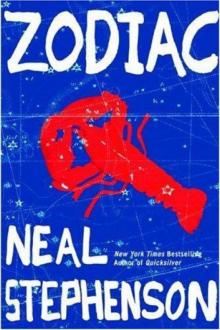 Zodiac: The Eco-Thriller
Zodiac: The Eco-Thriller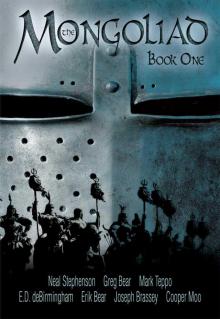 The Mongoliad: Book One
The Mongoliad: Book One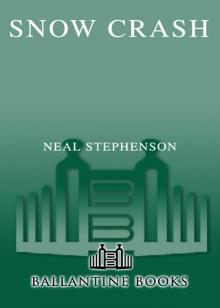 Snow Crash
Snow Crash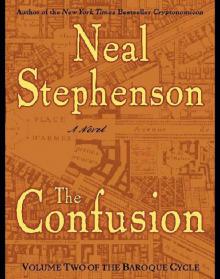 The Confusion: Volume Two of the Baroque Cycle
The Confusion: Volume Two of the Baroque Cycle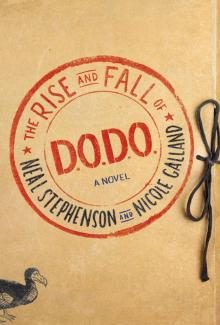 The Rise and Fall of D.O.D.O.
The Rise and Fall of D.O.D.O.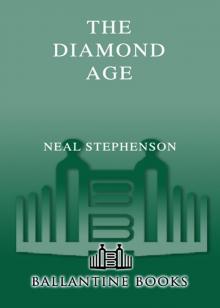 The Diamond Age: Or, a Young Lady's Illustrated Primer
The Diamond Age: Or, a Young Lady's Illustrated Primer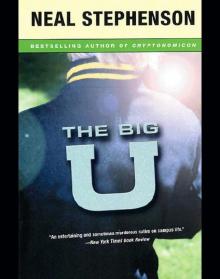 The Big U
The Big U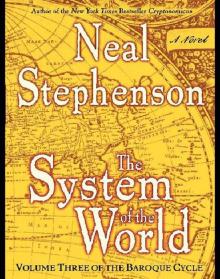 The System of the World: Volume Three of the Baroque Cycle
The System of the World: Volume Three of the Baroque Cycle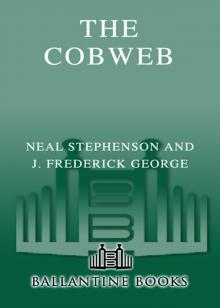 The Cobweb
The Cobweb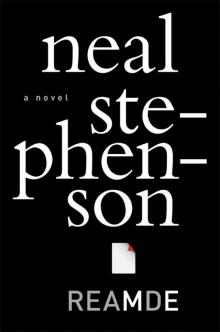 Reamde
Reamde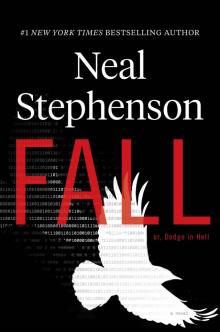 Fall; or, Dodge in Hell
Fall; or, Dodge in Hell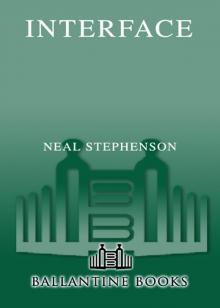 Interface
Interface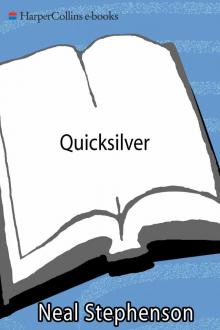 Quicksilver
Quicksilver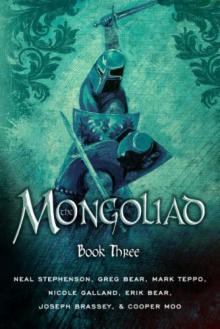 The Mongoliad: Book Three
The Mongoliad: Book Three Seveneves
Seveneves Atmosphæra Incognita
Atmosphæra Incognita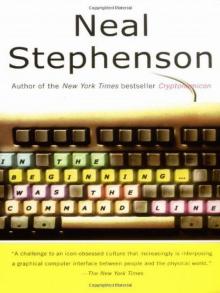 In the Beginning...Was the Command Line
In the Beginning...Was the Command Line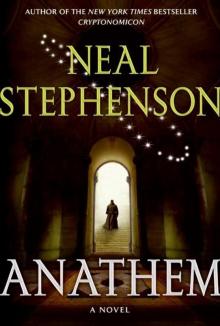 Anathem
Anathem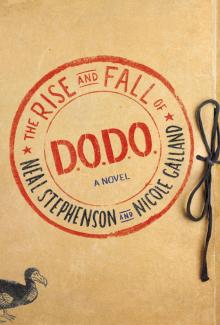 The Rise and Fall of D.O.D.O.: A Novel
The Rise and Fall of D.O.D.O.: A Novel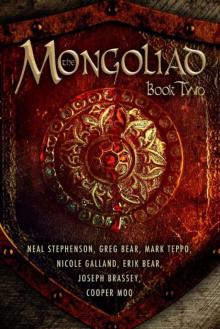 The Mongoliad: Book Two
The Mongoliad: Book Two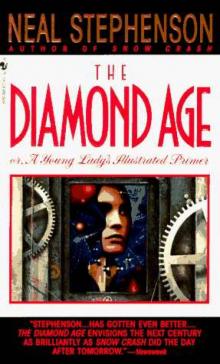 Diamond Age or a Young Lady's Illustrated Primer
Diamond Age or a Young Lady's Illustrated Primer THE System OF THE WORLD
THE System OF THE WORLD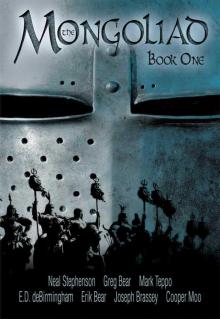 The Mongoliad: Book One tfs-1
The Mongoliad: Book One tfs-1 Some Remarks: Essays and Other Writing
Some Remarks: Essays and Other Writing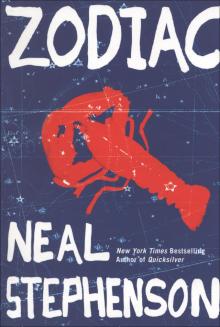 Zodiac
Zodiac Spew
Spew The Baroque Cycle: Quicksilver, the Confusion, and the System of the World
The Baroque Cycle: Quicksilver, the Confusion, and the System of the World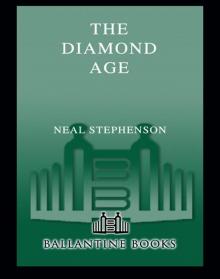 The Diamond Age
The Diamond Age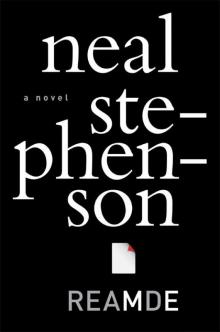 Reamde: A Novel
Reamde: A Novel In the Kingdom of Mao Bell
In the Kingdom of Mao Bell Mother Earth Mother Board
Mother Earth Mother Board Twelve Tomorrows - Visionary stories of the near future inspired by today's technologies
Twelve Tomorrows - Visionary stories of the near future inspired by today's technologies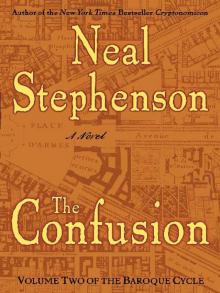 The Confusion
The Confusion The Great Simoleon Caper
The Great Simoleon Caper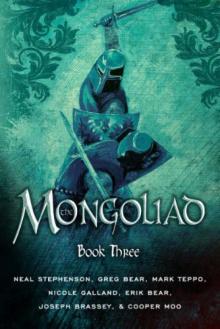 The Mongoliad: Book Three tfs-3
The Mongoliad: Book Three tfs-3